高中英语人教版必修一Unit 1 Friendship Reading课件(35张)
文档属性
| 名称 | 高中英语人教版必修一Unit 1 Friendship Reading课件(35张) |
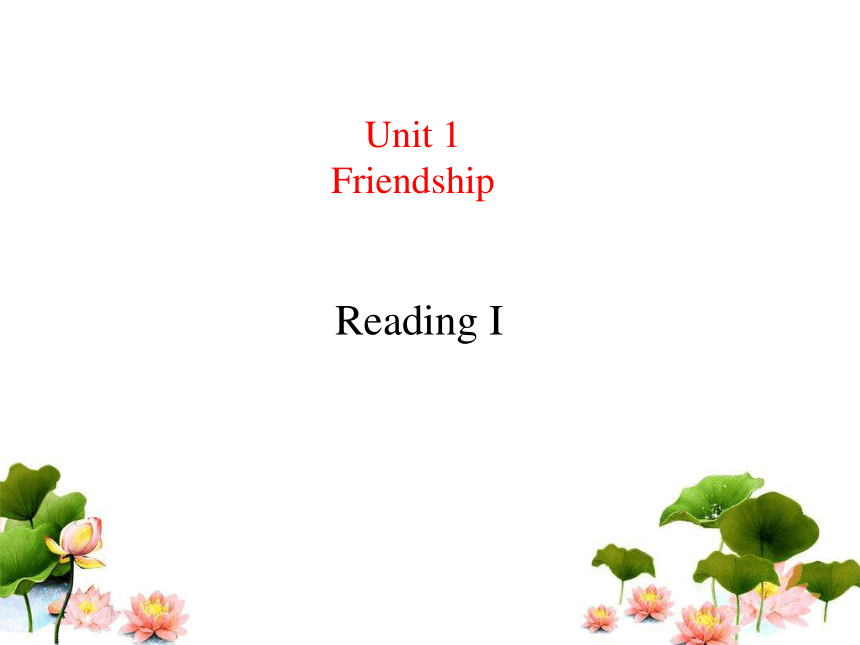
|
|
| 格式 | zip | ||
| 文件大小 | 1.9MB | ||
| 资源类型 | 教案 | ||
| 版本资源 | 人教版(新课程标准) | ||
| 科目 | 英语 | ||
| 更新时间 | 2018-08-30 00:00:00 | ||
图片预览

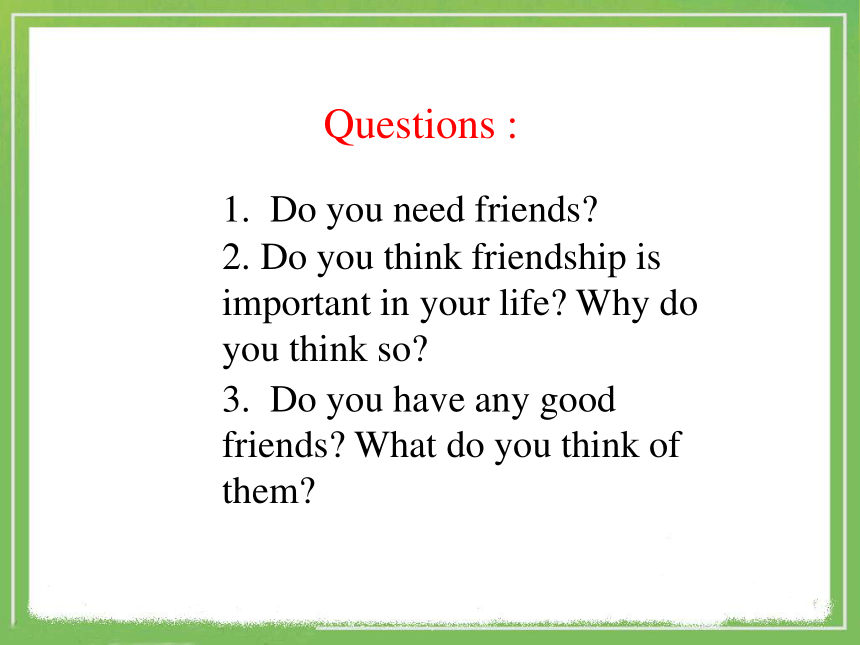
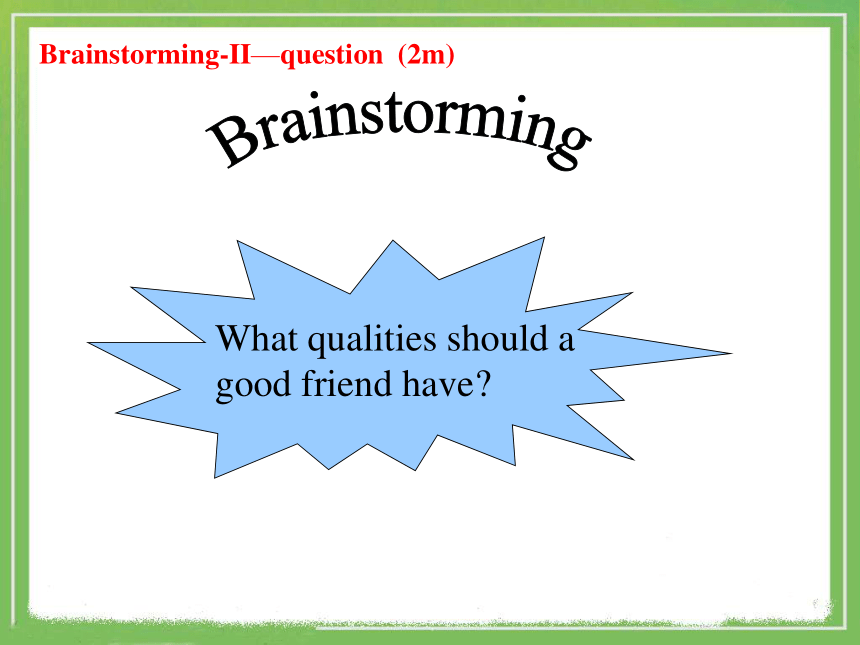
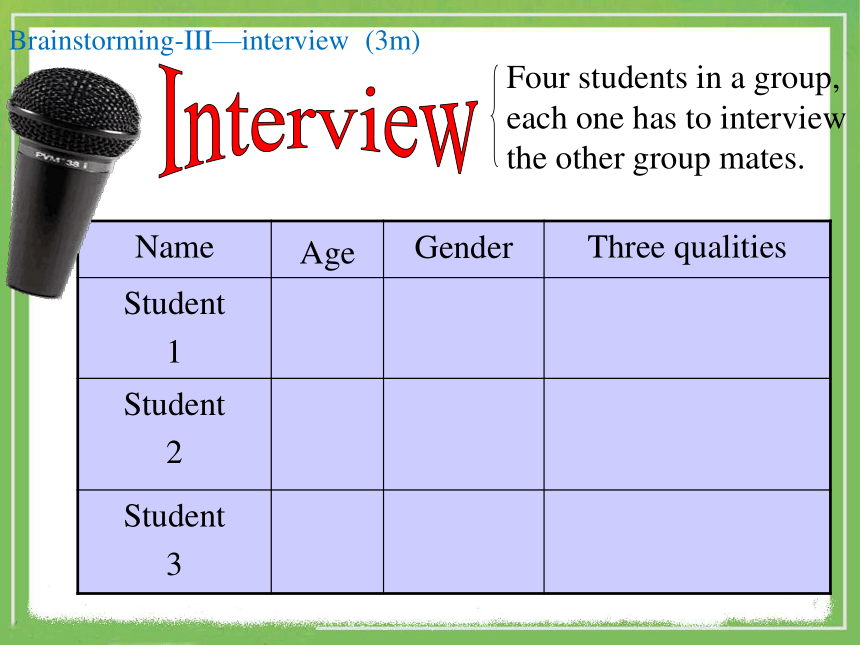
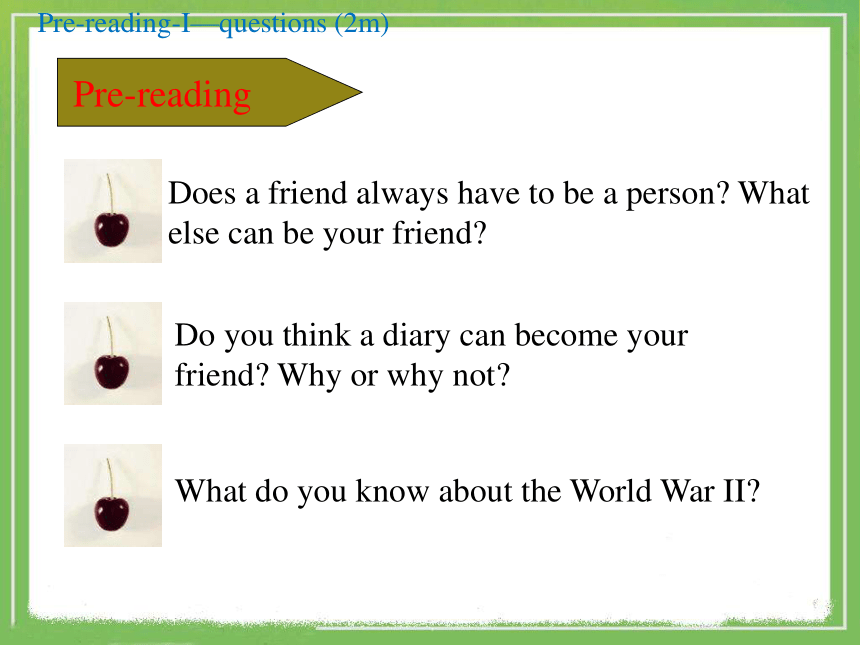
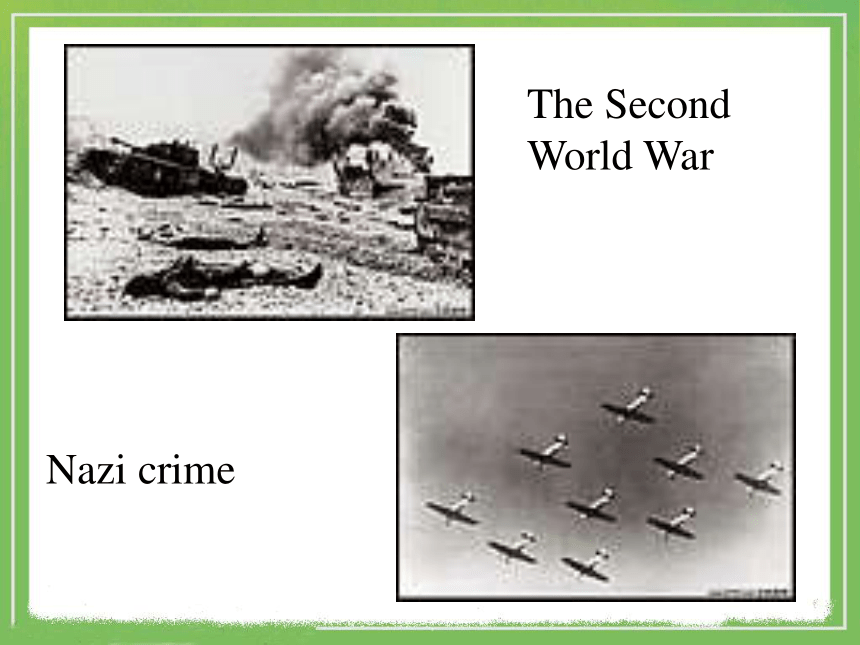
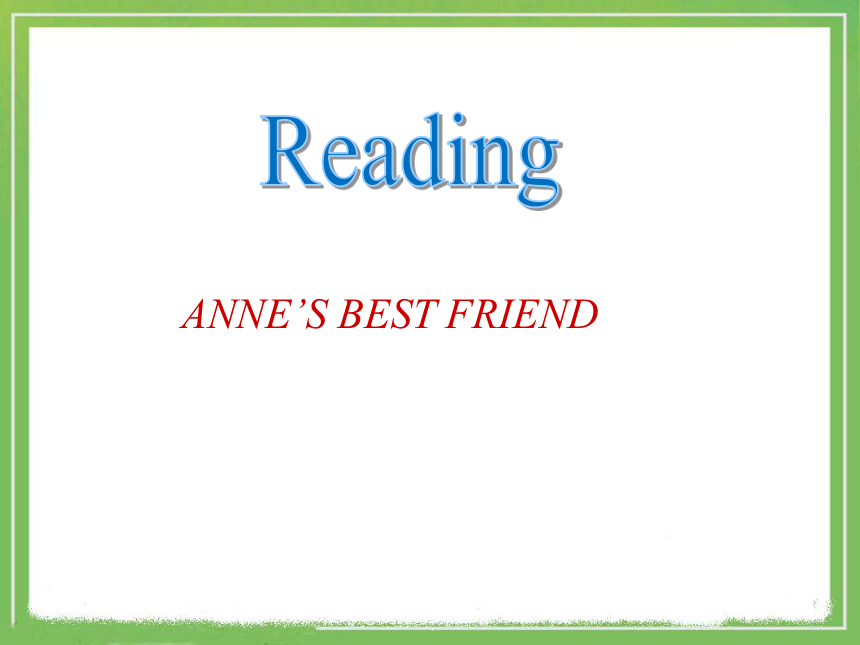
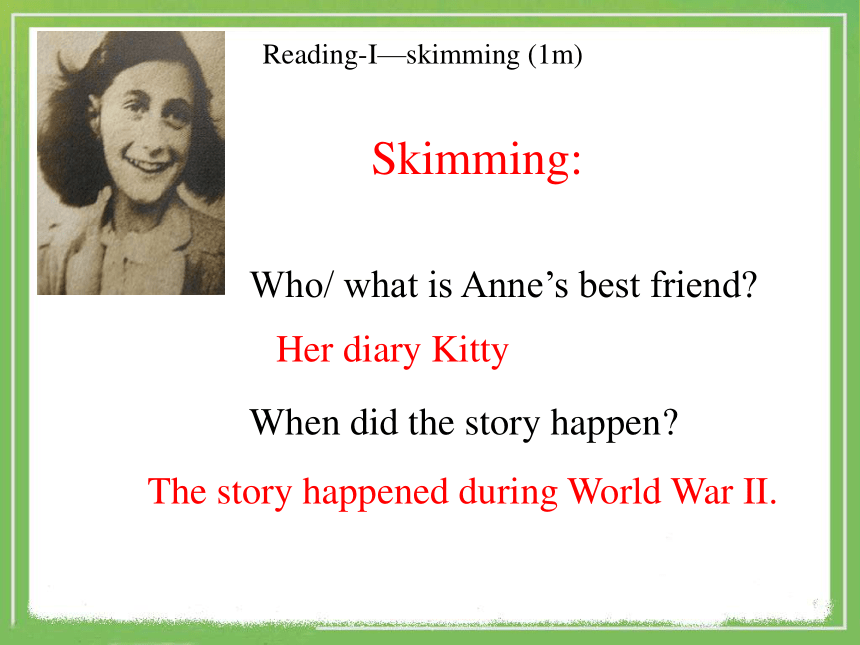
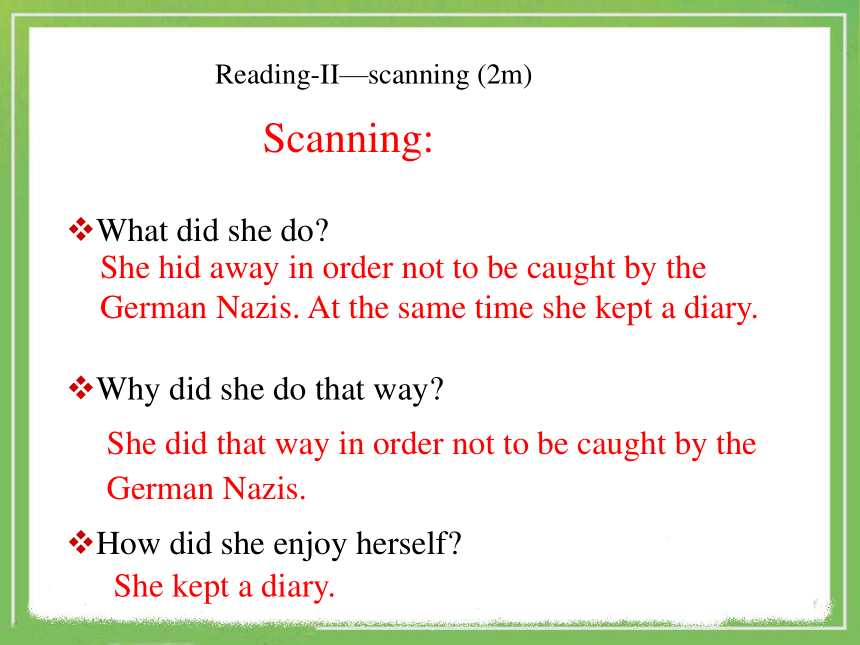
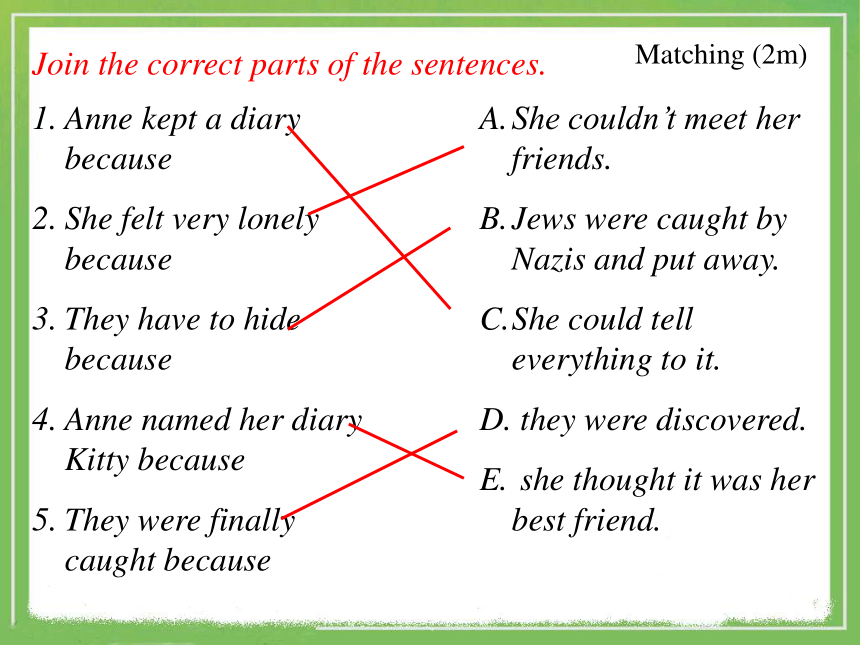
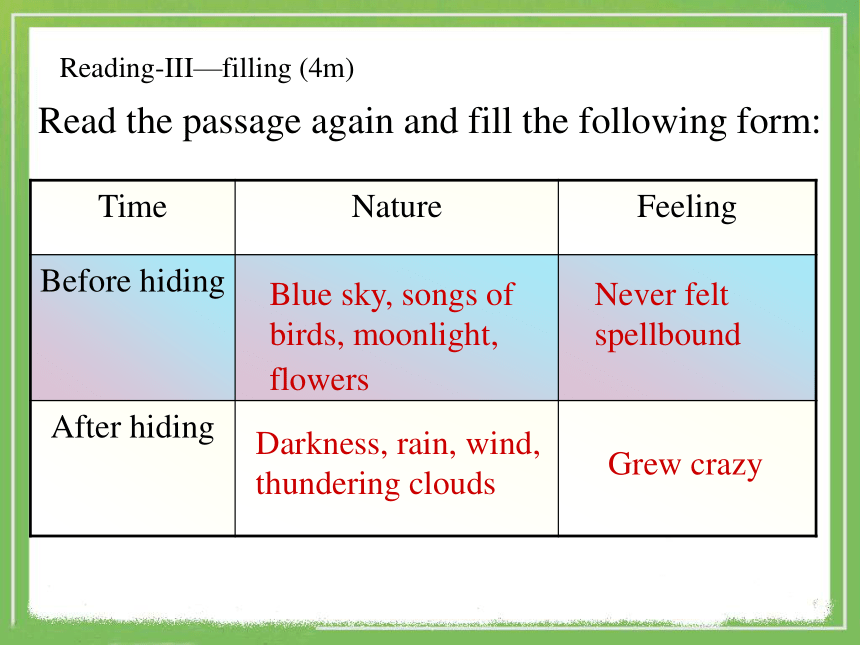
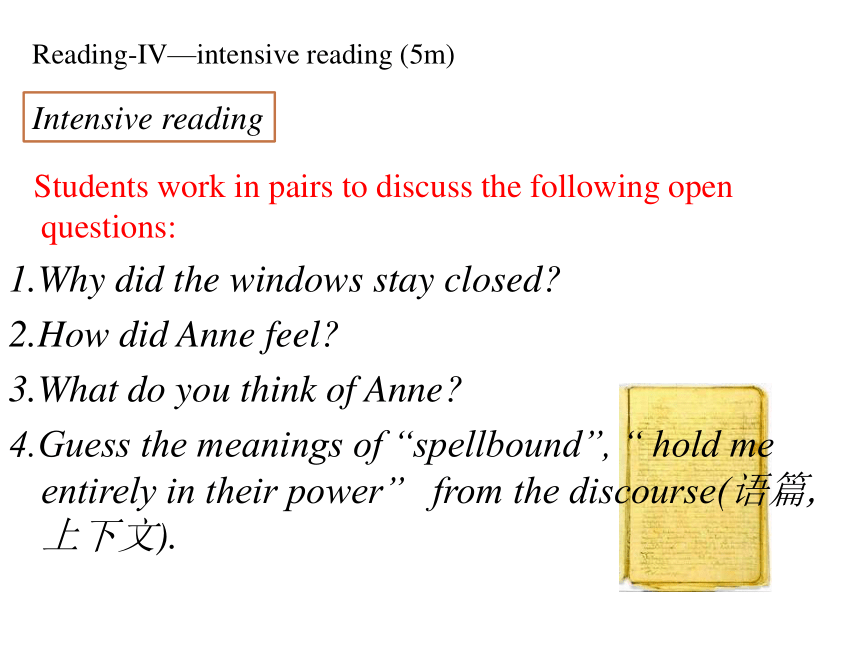
文档简介
课件35张PPT。Unit 1 FriendshipReading IQuestions :1. Do you need friends?2. Do you think friendship is important in your life? Why do you think so? 3.? Do you have any good friends? What do you think of them?What qualities should a good friend have?
BrainstormingBrainstorming-II—question (2m)InterviewFour students in a group, each one has to interview the other group mates.Brainstorming-III—interview (3m)Pre-readingDoes a friend always have to be a person? What else can be your friend?Do you think a diary can become your friend? Why or why not?What do you know about the World War II?Pre-reading-I—questions (2m)The Second World WarNazi crime ReadingANNE’S BEST FRIEND
Who/ what is Anne’s best friend?
When did the story happen?
Her diary KittyThe story happened during World War II.Skimming:Reading-I—skimming (1m)What did she do?
Why did she do that way?
How did she enjoy herself?
She hid away in order not to be caught by the German Nazis. At the same time she kept a diary.She did that way in order not to be caught by the
German Nazis. She kept a diary. Scanning:Reading-II—scanning (2m)Anne kept a diary because
She felt very lonely because
They have to hide because
Anne named her diary Kitty because
They were finally caught becauseShe couldn’t meet her friends.
Jews were caught by Nazis and put away.
She could tell everything to it.
they were discovered.
she thought it was her best friend. Join the correct parts of the sentences.Matching (2m)Read the passage again and fill the following form:Blue sky, songs of birds, moonlight, flowers Never felt spellboundDarkness, rain, wind, thundering cloudsGrew crazy Reading-III—filling (4m)
Students work in pairs to discuss the following open questions:
1.Why did the windows stay closed?
2.How did Anne feel?
3.What do you think of Anne?
4.Guess the meanings of “spellbound”, “ hold me entirely in their power” from the discourse(语篇,上下文).Intensive readingReading-IV—intensive reading (5m)①?Why did the windows stay closed?
②?How did Anne feel?
③ What do you think of Anne?
No. They shut the windows in order not to
be found and caught by the Nazis.She was afraid of being found and at the same time was eager to touch the outside world. Intensive Reading Give your own answers.④ Guess the meanings of “spellbound”, What is the meaning of “spellbound”? Use another word to substitute it.
Spellbound means to concentrate with delight for some time. Interested.Four students a group to discuss the situation:ActivityWhat will you take? Why?
How will you spend the 3 months?
How will you treat each other and make friends ?Suppose you four have to hide yourselves for 3 months. During the three months, you will be offered the basic food, water and clothes. Your group can take 5 things with you.Discussion (4m)Language points
for Reading I1.?go through 经历
go through two stages
经历阶级斗争的考验
go through the test in class struggle
The poor girl has gone through a lot since her parents died.Language points for Reading I ?
2. or =
otherwise3.?hide(hid, hidden) away4. set down=write downI set down everything that happened then.5. series (单复同形)
a series of + n (pl) There is a television series on this channel every night.a series of good harvests/ questions/ Long March memorial stampsThere has been a series of car accidents at the crossing. 6.?as 正如, 照……的方式
1) Do as I say.2) David, as you know, is a photographer.3) As I said in my last letter, I’m taking the exam in July.
7.?be/ get/ grow crazy about…1) The boy is crazy about skiing. 2) The teenagers are crazy about the pop singer.be crazy to do sth1) You are crazy to do such a thing.2) You are crazy to buy a car at such a high price.= It’s crazy of you to buy a car at such a high price. 8. to do inf. 作定语Do you have anything to eat? I’m extremely hungry.
9.?stay (link v) + adj/ n1) I stayed awake through the stormy night.2) He stayed single all his life.3) The weather stayed sultry.天气持续闷热。4) Stay seated!坐在那别动! 10.?do sth on purposeI think she lost the key on purpose.do sth with/ for the purpose of…He took along one of his pictures with the purpose of finding a job. = He went to town in order that he could sell the painting. 11. in order to = so as toHe went to town in order to sell the painting.12. much too + adj/ adv
too much (+ un) = more than enoughShe is afraid that the trip will be too much for me.
He doesn’t talk too much.
The dress is much too long for me.
I got into the taxi and the driver started off at once and drove much too fast.
It’s much too hot. 13.?happen vi.1) What time did the accident happen?2) No one know who had fired the gun— it all happened so quickly.sb. happen to do sth. (似乎)碰巧= to be or as if by chanceI happened to see her on my way to work.If you happen to find it, please let me know.It happens/ happened that clauseIt happened that they went out when I called.14.?hold/ have sb in one’s power 控制住/ 摆布某人 15. It’s the first/ second time that 某人第一/二次做The thundering clouds held me entirely in their power.It was the first time in a year and a half that I’d seen the night face to face.16. cheat v.1) to act in a dishonest way in order to win 欺骗,作弊
Any student caught cheating will have to leave the classroom.任何被发现作弊的学生将被赶出教室。2) to take from (someone) in a dishonest way 骗,骗取他们让那老妇人在她不懂的文件上签字,骗了她的钱。They cheated the old woman (out) of her money by making her sign a document she didn’t understand. cheat n.1) an act of cheating, dishonest trick 作弊行为
2) one who cheats 骗子17. lonely & alone1)He has been very lonely since his wife left him.
2) She lives alone.
3) The gloves alone cost $80. lonely: unhappy because of being alone or without friends 孤独的,寂寞的alone: 1) without any friends or separated from others 单独的
2) only 仅仅,只有。用于名词或代词之后。leave/let sb or sth alone Not take, touch or interfere with sb. or sth. 不带走,不触摸,不干涉某人或某事1) 不要动,那时我的东西。Leave that alone. It’s mine.2) 她要求不要打扰她。She has asked to be left alone.18. dare But as the moon gave far too much light, I didn’t dare open a window.dare具有情态动词和一般动词两种用法。He dares to do most things, but he doesn’t dare to do this.
He dared to do that and something even worse.
We could see he dared not tell the truth.
Dare she tell them what she knows?
How dare you say so?
We did not dare (to) tell him that he had failed again this time.
Does he dare (to) go out at night in such stormy weather? 在肯定句中的dare, dares, dared之后,不定式一般加to。2) 在否定句中和疑问句中的dare之后,不定式一般不加to。3) 在用do或does构成的否定句和疑问句中,理论上虽然应当有to, 实际使用却经常把to省略Homework Surf the Internet to find more information about Anne and to read more about Anne’s diary.
BrainstormingBrainstorming-II—question (2m)InterviewFour students in a group, each one has to interview the other group mates.Brainstorming-III—interview (3m)Pre-readingDoes a friend always have to be a person? What else can be your friend?Do you think a diary can become your friend? Why or why not?What do you know about the World War II?Pre-reading-I—questions (2m)The Second World WarNazi crime ReadingANNE’S BEST FRIEND
Who/ what is Anne’s best friend?
When did the story happen?
Her diary KittyThe story happened during World War II.Skimming:Reading-I—skimming (1m)What did she do?
Why did she do that way?
How did she enjoy herself?
She hid away in order not to be caught by the German Nazis. At the same time she kept a diary.She did that way in order not to be caught by the
German Nazis. She kept a diary. Scanning:Reading-II—scanning (2m)Anne kept a diary because
She felt very lonely because
They have to hide because
Anne named her diary Kitty because
They were finally caught becauseShe couldn’t meet her friends.
Jews were caught by Nazis and put away.
She could tell everything to it.
they were discovered.
she thought it was her best friend. Join the correct parts of the sentences.Matching (2m)Read the passage again and fill the following form:Blue sky, songs of birds, moonlight, flowers Never felt spellboundDarkness, rain, wind, thundering cloudsGrew crazy Reading-III—filling (4m)
Students work in pairs to discuss the following open questions:
1.Why did the windows stay closed?
2.How did Anne feel?
3.What do you think of Anne?
4.Guess the meanings of “spellbound”, “ hold me entirely in their power” from the discourse(语篇,上下文).Intensive readingReading-IV—intensive reading (5m)①?Why did the windows stay closed?
②?How did Anne feel?
③ What do you think of Anne?
No. They shut the windows in order not to
be found and caught by the Nazis.She was afraid of being found and at the same time was eager to touch the outside world. Intensive Reading Give your own answers.④ Guess the meanings of “spellbound”, What is the meaning of “spellbound”? Use another word to substitute it.
Spellbound means to concentrate with delight for some time. Interested.Four students a group to discuss the situation:ActivityWhat will you take? Why?
How will you spend the 3 months?
How will you treat each other and make friends ?Suppose you four have to hide yourselves for 3 months. During the three months, you will be offered the basic food, water and clothes. Your group can take 5 things with you.Discussion (4m)Language points
for Reading I1.?go through 经历
go through two stages
经历阶级斗争的考验
go through the test in class struggle
The poor girl has gone through a lot since her parents died.Language points for Reading I ?
2. or =
otherwise3.?hide(hid, hidden) away4. set down=write downI set down everything that happened then.5. series (单复同形)
a series of + n (pl) There is a television series on this channel every night.a series of good harvests/ questions/ Long March memorial stampsThere has been a series of car accidents at the crossing. 6.?as 正如, 照……的方式
1) Do as I say.2) David, as you know, is a photographer.3) As I said in my last letter, I’m taking the exam in July.
7.?be/ get/ grow crazy about…1) The boy is crazy about skiing. 2) The teenagers are crazy about the pop singer.be crazy to do sth1) You are crazy to do such a thing.2) You are crazy to buy a car at such a high price.= It’s crazy of you to buy a car at such a high price. 8. to do inf. 作定语Do you have anything to eat? I’m extremely hungry.
9.?stay (link v) + adj/ n1) I stayed awake through the stormy night.2) He stayed single all his life.3) The weather stayed sultry.天气持续闷热。4) Stay seated!坐在那别动! 10.?do sth on purposeI think she lost the key on purpose.do sth with/ for the purpose of…He took along one of his pictures with the purpose of finding a job. = He went to town in order that he could sell the painting. 11. in order to = so as toHe went to town in order to sell the painting.12. much too + adj/ adv
too much (+ un) = more than enoughShe is afraid that the trip will be too much for me.
He doesn’t talk too much.
The dress is much too long for me.
I got into the taxi and the driver started off at once and drove much too fast.
It’s much too hot. 13.?happen vi.1) What time did the accident happen?2) No one know who had fired the gun— it all happened so quickly.sb. happen to do sth. (似乎)碰巧= to be or as if by chanceI happened to see her on my way to work.If you happen to find it, please let me know.It happens/ happened that clauseIt happened that they went out when I called.14.?hold/ have sb in one’s power 控制住/ 摆布某人 15. It’s the first/ second time that 某人第一/二次做The thundering clouds held me entirely in their power.It was the first time in a year and a half that I’d seen the night face to face.16. cheat v.1) to act in a dishonest way in order to win 欺骗,作弊
Any student caught cheating will have to leave the classroom.任何被发现作弊的学生将被赶出教室。2) to take from (someone) in a dishonest way 骗,骗取他们让那老妇人在她不懂的文件上签字,骗了她的钱。They cheated the old woman (out) of her money by making her sign a document she didn’t understand. cheat n.1) an act of cheating, dishonest trick 作弊行为
2) one who cheats 骗子17. lonely & alone1)He has been very lonely since his wife left him.
2) She lives alone.
3) The gloves alone cost $80. lonely: unhappy because of being alone or without friends 孤独的,寂寞的alone: 1) without any friends or separated from others 单独的
2) only 仅仅,只有。用于名词或代词之后。leave/let sb or sth alone Not take, touch or interfere with sb. or sth. 不带走,不触摸,不干涉某人或某事1) 不要动,那时我的东西。Leave that alone. It’s mine.2) 她要求不要打扰她。She has asked to be left alone.18. dare But as the moon gave far too much light, I didn’t dare open a window.dare具有情态动词和一般动词两种用法。He dares to do most things, but he doesn’t dare to do this.
He dared to do that and something even worse.
We could see he dared not tell the truth.
Dare she tell them what she knows?
How dare you say so?
We did not dare (to) tell him that he had failed again this time.
Does he dare (to) go out at night in such stormy weather? 在肯定句中的dare, dares, dared之后,不定式一般加to。2) 在否定句中和疑问句中的dare之后,不定式一般不加to。3) 在用do或does构成的否定句和疑问句中,理论上虽然应当有to, 实际使用却经常把to省略Homework Surf the Internet to find more information about Anne and to read more about Anne’s diary.
